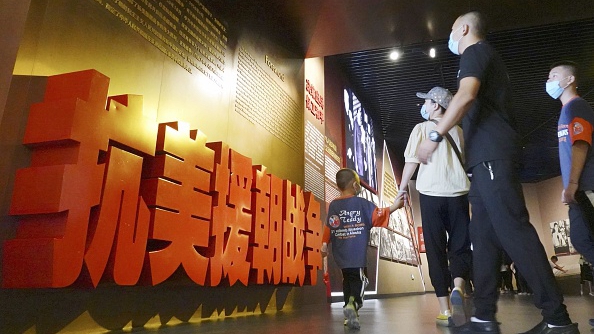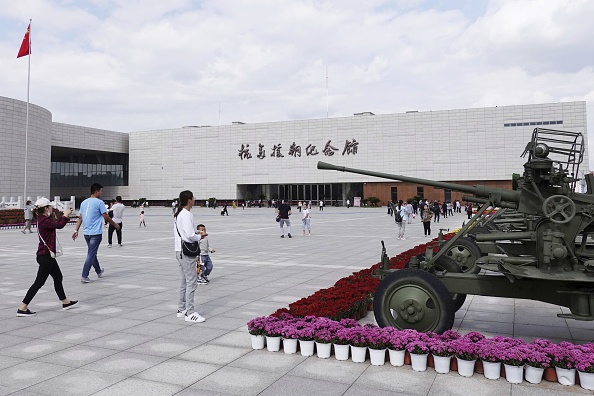
The interior of the Memorial Hall of the War to Resist U.S. Aggression and Aid Korea, which displays relics related to the 1950-1953 Korean War, in Dandong City, Liaoning Province, northeast China, September 20, 2020. /Getty
The interior of the Memorial Hall of the War to Resist U.S. Aggression and Aid Korea, which displays relics related to the 1950-1953 Korean War, in Dandong City, Liaoning Province, northeast China, September 20, 2020. /Getty
Editor's note: Iram Khan is a Pakistan-based commentator on international affairs. The article reflects the author's opinions, and not necessarily the views of CGTN.
70 years after the U.S. military crossed the 38th parallel into the Democratic People's Republic of Korea (DPRK), the legacy of China's decision to participate in the War to Resist U.S. Aggression and Aid Korea is that of protecting its national interests at all costs and against all odds. Meanwhile, American adventurism is still debated over the soundness of expanding an engagement to an unmanageable level.
The young People's Republic of China stood by DPRK in a joint resistance by the Chinese People's Volunteers Army, the DPRK people and its armed forces. It was a signal to the world that this new China was an active and responsible major country; one that was ready to protect its partners.
The victory was decisive. It made a point so strong that the U.S. remained at bay for decades to come and has not directly engaged any major power ever since.
With the threat neutralized, China then focused on a rapid economic reform program. Agriculture, industry and policy formulation framework were all revamped to push the country out of poverty and bring it on par with modern and technologically advanced nations.
Consequently, China is now resurging as a changed country. While it defeated a much stronger force back then, its military prowess has increased manifold. At the same time, it has risen as the world's second-largest economy and the gap with the first is closing fast.
What has not changed since the War to Resist U.S. Aggression and Aid Korea, however, is America's pursuit of global primacy. In doing so, it has seldom adopted an accommodating attitude. Call it a compulsion of the military-industrial complex to profit from war or call it an instinct of American policymakers to extend their country's overarching influence, the propensity has cost the world dearly.
Seeing the inevitable rise of China, the U.S. is manifesting an ungrounded sense of insecurity. China does not possess hegemonic ambitions and, in the words of Foreign Minister Wang Yi, does not wish to export its ideology or to interfere in other countries' internal affairs.

The Memorial Hall of the War to Resist U.S. Aggression and Aid Korea, which displays relics related to the 1950-1953 Korean War, in Dandong City, Liaoning Province, northeast China, September 20, 2020. /Getty
The Memorial Hall of the War to Resist U.S. Aggression and Aid Korea, which displays relics related to the 1950-1953 Korean War, in Dandong City, Liaoning Province, northeast China, September 20, 2020. /Getty
Despite that, the U.S. is drumming up anti-China rhetoric in diplomatic, technological and trade arenas, not realizing that the China of today is more self-reliant and, after continuously opening up, has an increased number of options to deal with such scenarios.
A healthy competition among major countries is always good. It engenders innovation, increases productivity and nurtures growth. But when it is aimed to deny a level playing field to competitors, the result is the opposite. This is exactly what the U.S. is doing at the global stage with the countries it perceives as its rivals.
In response, the spirit of the Chinese people that the world saw during the War to Resist U.S. Aggression and Aid Korea can be seen even today. China's quest for self-reliance has accelerated with the unilateral actions of the U.S. against Chinese technologies and goods.
As discrimination against Chinese academics is also rising in the U.S., they are opting to return to China and invest their energies and knowledge in their homeland. This, in turn, is further strengthening the scientific and intellectual base of the country.
While the solution to modern-day challenges is not shying away from battles, it also calls for directing the passion toward constructive activities. As President Xi Jinping said during his recent visit to the Military Museum of the Chinese People's Revolution in Beijing, the spirit of the War to Resist U.S. Aggression and Aid Korea should be inherited for the rejuvenation of the nation.
China has made achievements since the war that few other nations can match. The impending elimination of absolute poverty, the shift to high-quality growth and the ability to fulfill global manufacturing and medical demands in times like the COVID-19 pandemic are some examples of the will of its people to put in their best in the face of adversity.
With impressive economic progress, China's international obligations have also increased. The War to Resist U.S. Aggression and Aid Korea had provided an early opportunity for the country to show its willingness to support its allies. With the enhanced resources and soft power of a major country, it now extends its support to all those who need it.
Be it the participation in the UN peacekeeping force, assisting in the solution of diplomatic and military standoffs or helping the world in mitigating climate change, China is at the forefront of multinational efforts to solve the world's gravest problems.
Moreover, China is integrating markets through the Belt and Road Initiative (BRI), building trade capacities of its neighbors through free trade agreements and fostering a cooperative international environment by encouraging regional and multilateral bodies.
The elevated status and the ensuing responsibilities of China in the comity of nations since its victory in the War to Resist U.S. Aggression and Aid Korea are because of the dedication it has shown in surmounting arduous challenges. As the perseverance continues, the shared future that the country is striving for is bound to become a reality.
(If you want to contribute and have specific expertise, please contact us at opinions@cgtn.com.)